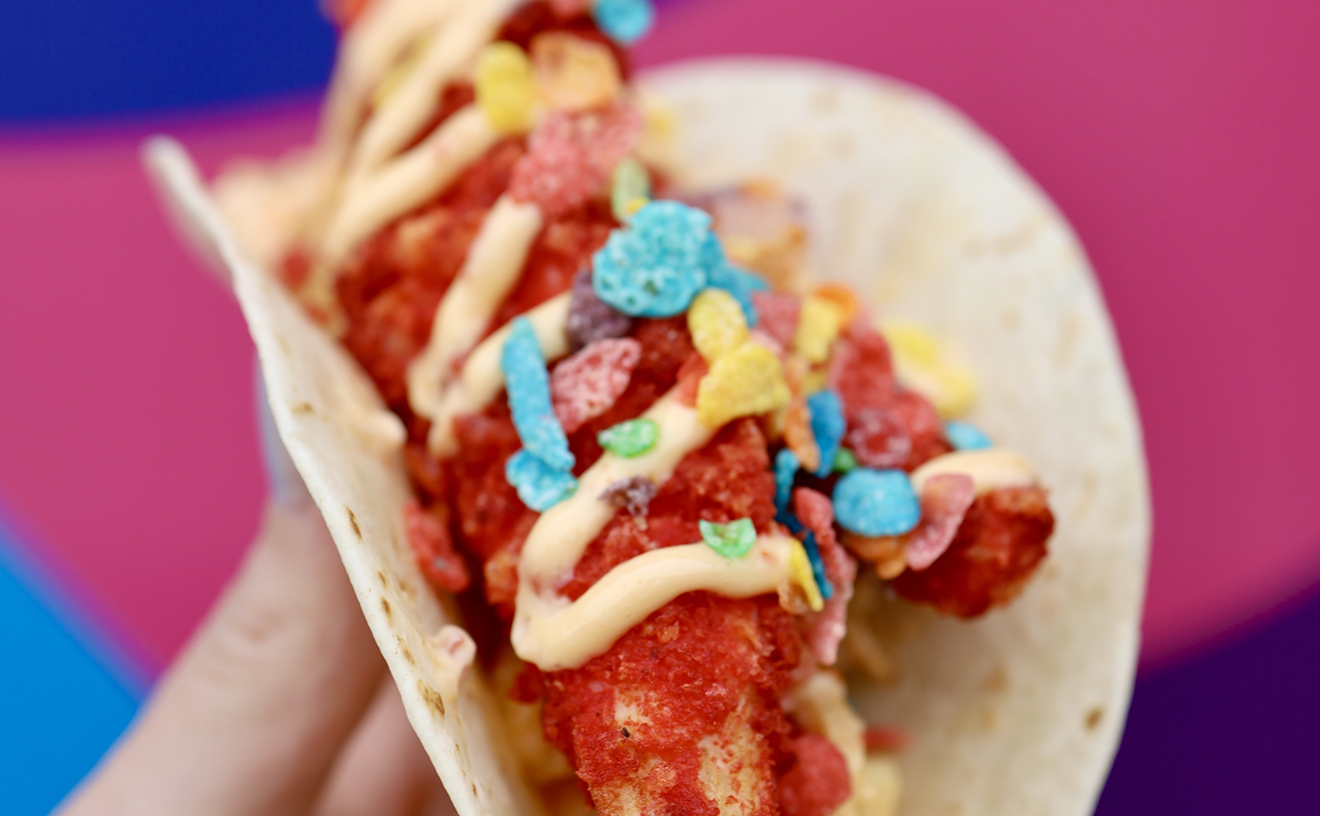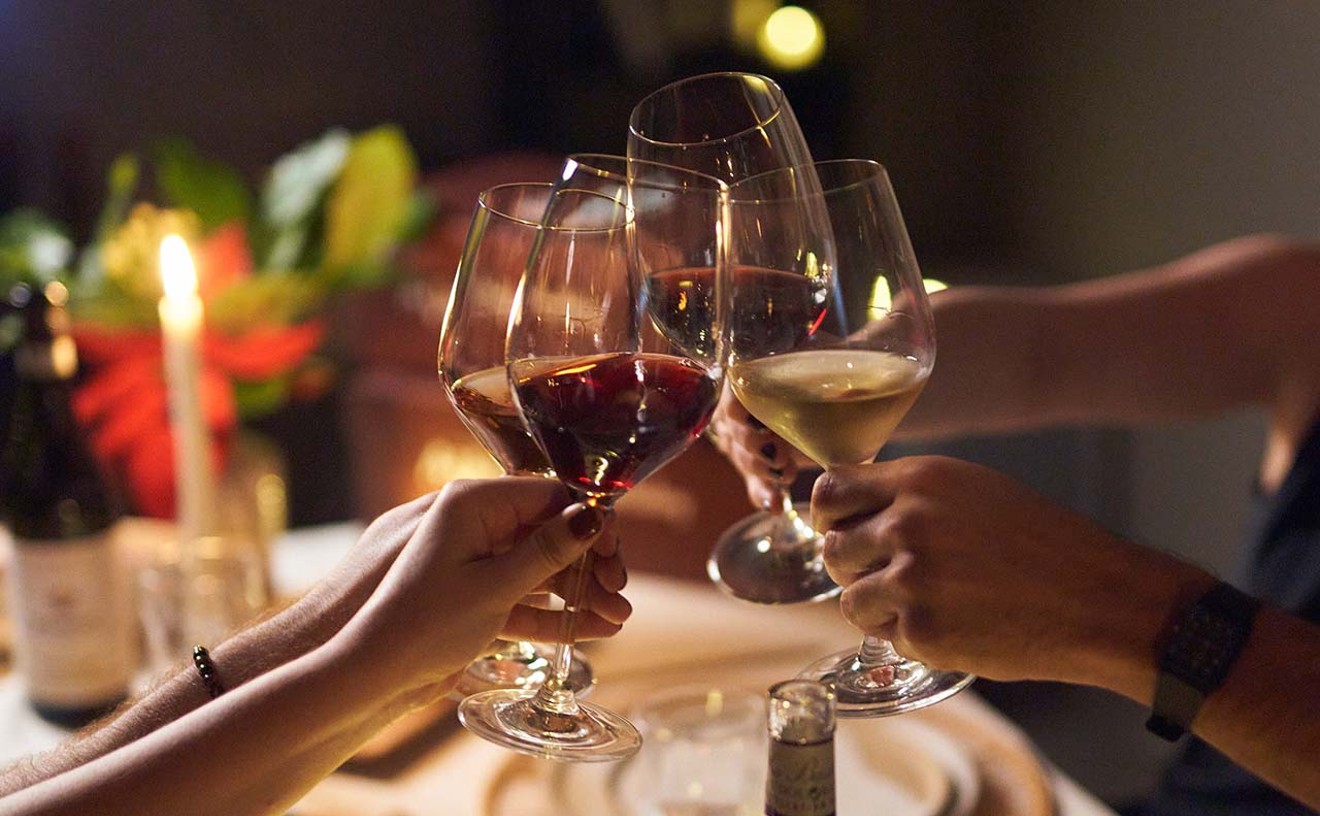But in the realm of social consciousness, it's not celebrities, regardless of their connections, who bring about lasting change. Their roles will always be more symbolic than pragmatic. If women are to improve their status, they would do well to look more often to their own community leaders. Quietly and without fanfare women are buying and selling real estate, trading on the market, running the city's shops (and I don't mean boutiques filled with knickknacks or frilly blouses). These days women are more than cooks in the kitchen; they own the kitchen.
Ask Suwanee Santon. She's owned several kitchens in South Florida, starting with Kampai, a Japanese restaurant in Miami she opened with a partner. Today she's invested in Maiko Thai Restaurant and Lounge, a month-old eatery on Collins Avenue in Miami Beach.
A popular misconception, one I was a victim to myself, is that Maiko Thai Restaurant and Lounge and Maiko Japanese Restaurant and Sushi Bar on Washington Avenue are joint ventures. While they share the same first name, which roughly translates as "beautiful young girl," the truth is that the savvy Santon, who founded Maiko Japanese, sold it this past November to long-time friend Willy Manorat and his cousin, Khruawan Russmetes. (Manorat owned Thai House I in Hialeah; Russmetes operated Thai House II in North Miami.) The sale came just six months after the restaurant opened, as its business was booming, and according to Santon, it brought her "good money."
By early January, Santon was back in the kitchen, this time at her new restaurant, Maiko Thai. She was also in the lounge and the dining room, painting the walls a royal purple, installing the gold wing chairs, and hanging the pleated Oriental fan on the violet backdrop. This is a more intimate room than Maiko Japanese, one in which Santon hopes to foster good customer relations as well as a healthy cash register. One of her regrets the last time around is that the Japanese restaurant's frantic early business and quick sale left her little time for owner-customer interaction.
Nor has business abated under Maiko Japanese's new owners. Not only did I have to wait for a table during a recent visit, a crowd still lined the sidewalk when I left. On a Sunday, mind you. Manorat, whose mixed Thai-Japanese heritage makes him an appropriate successor, is maintaining Santon's menu. In fact, Santon's son Tony is still there, creating innovative sushi such as the kimchee roll, a blend of conch, spinach, asparagus, scallions, cucumber, and masago (fish eggs) with a Korean-influenced kimchee sauce. On a recent evening, I stopped by for my personal favorites: the spider roll, a soft-shell crab, asparagus, avocado, scallions, and masago mixture wrapped in sticky rice; and ebi misoyaki, a delectable shrimp in a semisweet miso sauce.
For those whose sushi cravings can't overcome the prospect of waiting in line, I recommend scurrying over to Maiko Thai, one block south, one block east. Don't look for sushi on the menu (confused diners often ask for it), but be prepared for other delights: tender-crunchy soft-shell crab; crisp (if slightly greasy) Thai egg rolls; and an absolutely inspirational mee krob, a salad of crispy rice noodles and shrimp covered with a just-sweet-enough syrup. Goongtod, shrimp wrapped with pork and bean thread noodles and then fried, is also a sure antidote to any lingering sushi stirrings.
But even with some overflow from Maiko Japanese, business has been slow at Maiko Thai. This can probably be attributed to the obvious: not only is the restaurant barely unwrapped, there exists that confusion with the name. I suspect that South Beach diners, who discovered Maiko Japanese in such short order, will soon be packing the newest Maiko.
Santon, however, suggests another concern. Thai food, she believes, is simply not as popular as Japanese, especially in this neighborhood, where many of the residents are extremely health conscious. Duck or Thai-style curry with beef, for example, are perceived as more fattening than a sushi-sashimi combo (the biggest seller at Maiko Japanese).
It's for precisely this reason Santon prepares her Thai food with fat-free Japanese in mind. Given a choice between steaming and frying, this calorie-smart chef will choose the vapor way. She offers on the menu both white and brown rice, the brown actually more complemetary to her vegetable-heavy cuisine (with any dish on the menu, vegetables can be substituted for meat). When she turns to salmon, as with the pia lard prig, for instance, she'll steam the fish then coat it with diced celery, pineapple, water chestnuts, and a piquant sauce of chili and garlic. The salmon is incredibly tender when prepared this way; however, the drawback is a tendency to rawness in the middle. Still, this is creative cookery, and served beautifully on oversized dinner plates. For those concerned one way or the other about the great Thai tradition of torched tastebuds, Maiko Thai provides a heat index on the menu: * a coward, ** careful, *** adventurous, and **** native Thai.
Sauteed duckling in brandy sauce lays no claim to low fats, only to delicacy. But also excellent is the pad lad nah, a transparent sen lek noodle topped with chicken and a light gravy. A comparable dish is Maiko Japanese's yakisoba, a sauteed buckwheat noodle with chicken, bean sprouts, and cabbage. To name one better than the other would be a crime. Both dishes deserve to serve time imprisoned on your palate.
So given Santon's predilection, why open a Thai restaurant? Why not another Japanese place? Clearly the challenge to create is stronger with the Thai. After all, Santon is serving a healthy imagination along with her pork with basil leaves. And she can enjoy the excitement of drawing a new crowd (or educating the same old one) to her establishment. Like any determined businesswoman, Santon is prepared to fight for what she wants and make the winning that much more enjoyable.
Certainly she has the experience. In Fort Lauderdale, she owned Bangkok Inn, and she also worked as a chef for South Beach's Thai Toni. To open another of her own Thai restaurants seemed a wise move at the time, even though with Thai Toni and Ruen Thai, there are now three within walking distance of each other. Time and patrons will tell, but thus far it's safe to say that Maiko Japanese may be symbolized by a young girl poised at adulthood, while Maiko Thai is an all natural woman.










